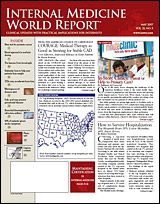Publication
Article
Internal Medicine World Report
PPIs Reduce Ulcer-Related Bleeding, Need for Surgery
Author(s):
But Optimal Use Still Unknown
Mayo Clinic Proceedings
Proton pump inhibitor (PPI) therapy decreases rebleeding episodes and the need for surgical intervention in patients with peptic ulcer bleeding, according to a meta-analysis published in the (2007; 82:286-296).
The analysis also revealed that PPIs significantly reduce mortality in patients with certain high-risk characteristics, including active bleeding and a nonbleeding visible vessel.
"All patients who have recently bled from a peptic ulcer would benefit from the early administration of a PPI," explained coinvestigator Colin Howden, MD, of the Division of Gastroenterology at Northwestern University. "Those with the most severe bleeding [ie, those found at endoscopy to have a nonbleeding visible vessel or active bleeding from the ulcer] will benefit the most. However, it is important to understand that PPI therapy is not the mainstay of treatment in those patients; instead it should be regarded as an adjunct to appropriate endoscopic hemostatic treatment."
Dr Howden and colleagues recently conducted this meta-analysis of randomized controlled trials that compared oral or IV PPIs with placebo or a histamine2-receptor antagonist in patients with peptic ulcer bleeding. The final analysis included 24 trials and 4373 participants. The primary outcome measure was mortality from any cause within 30 days of randomization.
Treatment with PPIs had no significant effect on overall mortality but reduced risk for rebleeding by 51%, the need for surgical intervention by 39%, and the need for further endoscopic treatment within 30 days of randomization by 68%.
Treatment with PPIs reduced mortality by 65% in trials conducted in Asia and by 47% in trials that included only patients with active bleeding or a nonbleeding visible vessel. No effect on mortality was observed in trials that used lower-dose IV or oral PPIs.
IMWR
"It is important to note that there has been only 1 published randomized controlled trial of IV PPI therapy for bleeding ulcer conducted in the United States," Dr Howden told .
"That trial actually failed to show a statistically significant advantage of IV pantoprazole [Protonix IV] over IV ranitidine [Zantac] in rebleeding rates," he said. "However, recruitment to that trial was very low, and the trial was terminated prematurely. Therefore, the apparent lack of advantage of the IV PPI may have been due to a type II statistical error."
Geographic location was the only characteristic significantly associated with the effects of treatment on mortality, rebleeding, or the need for surgery. PPIs had a greater impact on mortality in trials conducted in Asia than in those conducted in Europe, North America, and South America.
Despite extensive clinical study and several other meta-analyses, the optimal dose, route of administration, and duration of PPI therapy remains unknown.
"At the moment, we have no clear evidence-based answers to this," Dr Howden said. "Patients with low-risk endoscopic stigmata [ie, a clean ulcer base or a flat pigmented spot in the ulcer base] should probably receive oral PPI therapy; they do not require IV therapy. Based on the clinical trials that have been conducted, the oral PPI should probably be dosed twice daily."
Data from the clinical trials reviewed for his study led Dr Howden to recommended that patients with high-risk endoscopic stigmata (ie, active bleeding, a nonbleeding visible vessel, or a firmly adherent clot) should receive appropriate endoscopic hemostatic treatment and high-dose IV PPI treatment (at least the equivalent of an 80-mg IV bolus of omeprazole [Prilosec], followed by an IV infusion of at least the equivalent of 8 mg omeprazole per hour for 72 hours). Patients whose condition stabilizes after 72 hours of IV PPI therapy may be switched to an oral PPI.
"Our study should demonstrate that PPI therapy plays a role in the management of patients with ulcer bleeding, but that it is not a panacea, and it is not a substitute for general supportive care and the appropriate use of endoscopic hemostatic treatment," Dr Howden said. "Hopefully, it will also demonstrate that many patients with ulcer bleeding may be quite adequately treated with oral PPI therapy and may not require more expensive IV PPI therapy."
Key points
? PPIs decrease rebleeding episodes and the need for surgery in patients with bleeding peptic ulcers.
? PPIs also significantly reduce mortality in some high-risk patients.
? PPI therapy is not the mainstay of treatment in this patient population, but is an adjunct to endoscopic hemostatic treatment.
? The optimal dose, route of administration, and duration of PPI therapy remain unknown.





